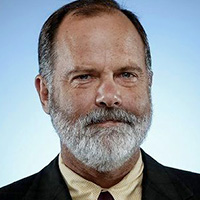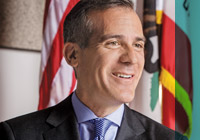There was a time when Republicans held sway in Los Angeles and Sacramento — when Dick Riordan was mayor and Pete Wilson was governor, or earlier, when Earl Warren commanded the state’s politics and Los Angeles was a Republican bastion. In those days, debates over major issues featured typical tensions between the parties, with one side arguing for frugality and the other for human services. Those days are gone.
Today, not a single Republican holds statewide office in California. Los Angeles Mayor Eric Garcetti is an up-and-coming Democrat; Gov. Jerry Brown is a career-capping Democrat. Two Democrats are contesting the state’s open Senate seat; no Republican made the runoff. Fourteen out of 15 members of the Los Angeles City Council are Democrats. Only one Republican elected official at any level — local, state or federal — lives within the city limits of Los Angeles: City Councilman Mitchell Englander.
There are no more furiously argued questions in California politics than: How did the Republicans lose their grip? And how can they regain their relevancy? The answers are complicated, and not everyone agrees, but most accept a few points.
> The Democrats have built a bench. In the biggest cities, strong candidates and office holders at the local level have given Democrats a deeper pool to draw upon. Dianne Feinstein was mayor of San Francisco and Barbara Boxer a Northern California congresswoman before achieving statewide positions. Kamala Harris started as a San Francisco district attorney and appears headed for the United States Senate; Antonio Villaraigosa and Garcetti both served on the Los Angeles City Council before moving to the mayor’s office and now are eyeing bigger things.
> Republicans statewide have shown recent flexibility in selecting nominees, but it has done them little good. In 2002, most observers believed Riordan, who was pro-choice and favored gay rights, would be a formidable challenger to Gov. Gray Davis. But primary voters preferred Bill Simon, a more hard-core conservative, who was defeated roundly in the general election. Arnold Schwarzenegger was a special case because of his unusual name recognition. More recently, in 2010, Republicans nominated Meg Whitman, who supported abortion rights. Then, in 2014, they nominated Neel Kashkari, who supported abortion rights and same-sex marriage. But both fell to Jerry Brown. Among the reasons: GOP moderates in California get swamped by backwash from their harder-right national party and its more conservative candidates — and there is limited advantage to having an “R” designation on the ballot when fewer than a third of the voters in this state are registered Republicans.
> Republicans have alienated young people and Latinos with their stands on gay marriage and immigration. These may be the party’s two most serious liabilities. Starting with Wilson and his support for Prop. 187, which sought to deny many services — including vaccines and public education — to undocumented immigrants, many Republicans have staked out positions on immigration that strike Latinos as hostile to their interests, even to their families. On gay marriage, every passing year shows support growing, especially among young people, for an idea that many Republicans have yet to embrace. The party’s intransigence reinforces the notion that it is mean-spirited.
Rob Stutzman, one of California’s leading GOP political consultants, concedes that the picture is grim. The party’s image, he acknowledges, is that of “Southern white men,” a perilously narrow base upon which to build a political coalition, especially in California.
Stutzman is less inclined than some to hold Wilson responsible for the party’s difficulty with Latinos. He argues that the former governor’s support for Prop. 187 may have been damaging at the time, but that was decades ago, and most young voters probably don’t remember Wilson, much less hold a grudge against him. Donald Trump, however, has supplied new reasons for Latinos to doubt the Republican Party — denying benefits to undocumented immigrants is one thing; calling them rapists and building a wall to keep them out is another.
To be successful in California during this election cycle, Stutzman said, Republican candidates have to make the difficult decision to oppose their presidential nominee. “You have to have the credibility to say Trump does not represent my Republican Party,” he said. “You have to vote against him.”
Looking ahead, the party faces a double challenge: figuring out how to elevate local politicians into higher offices while also hoping to strike lightning at the top. “We need a transformational candidate at the state level,” Stutzman said. That was what the self-financed Meg Whitman attempted to be in 2010, only to lose handily to the resurgent Jerry Brown, whose bid for a third term, more than two decades after his second, was aided by strong support from Latinos.
Meanwhile, billionaire Charles Munger has provided financial support for the party, which gives it a foundation to rebuild upon. Next comes the arduous work of reshaping the party’s image, identifying openings, recruiting candidates and persuading voters that the GOP represents their interests. Success depends on finding a way back to the center and a return to values and ideas that once appealed to moderates, young people and voters of color. It is sure to be a long project.
























